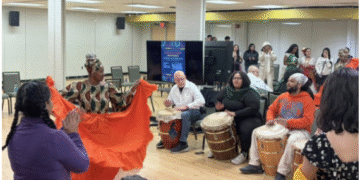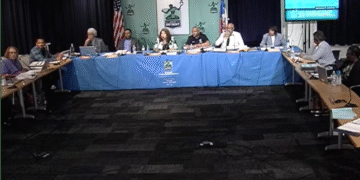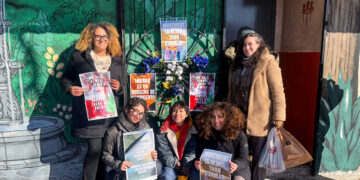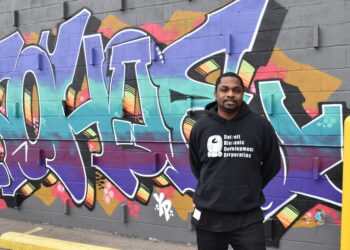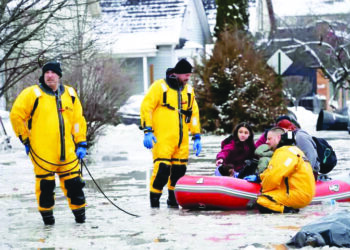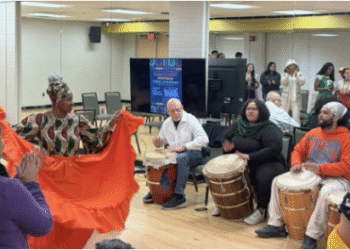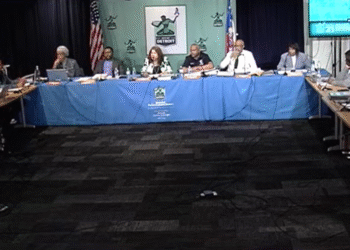Restricted by immigration laws, unauthorized immigrants in the United States face severe challenges, including the inability to visit family members left behind.
This “slow violence” becomes most painful during times of death, causing “transnational grief” as families are permanently separated and unable to reunite, mourn and bury their dead.
“Under the current system, unauthorized immigrants are denied freedom of mobility,” said Kristina Fullerton Rico, lead author of a recent study on transnational grief and a postdoctoral fellow at the Center for Racial Justice at the University of Michigan’s Ford School of Public Policy.
“For immigrants in this position, transnational death is the worst-case scenario because it means permanent separation. Unauthorized status not only complicates the grieving process but also exacerbates feelings of powerlessness, guilt and isolation among transnational mourners.”
The six-year study, involving in-depth interviews with 20 participants, reveals the emotional and social toll of these restrictions on undocumented immigrants and their families. Published in the journal Social Problems, the study primarily focuses on Mexican families but is relevant to all individuals with undocumented status.
For more than two decades, Verónica has lived in the same small apartment in New York City, working tirelessly to send money back to her mother in Mexico. But when her mother’s health began to fail a few years ago, Verónica faced a harsh reality—her undocumented immigration status meant she could not travel to be by her mother’s side or attend her funeral.
Reflecting on her mother’s death, Verónica recalled how video calls with her mother left her feeling helpless. “I could see she was in pain, and there was nothing I could do to help,” she said.
An estimated 11 million undocumented immigrants in the U.S. face the anguish of “transnational grief”—the experience of mourning a loved one’s death from afar due to their immigration status. As this population ages and their networks of family and friends in their home countries diminish through death, their undocumented status has become a “golden cage,” restricting their ability to travel for funerals and final goodbyes.
“I could easily get on a plane. The problem is how to get back,” Verónica said of her undocumented status, sobbing in frustration.
Using a comprehensive ethnographic approach, Fullerton Rico identified several key repercussions of transnational grief:
- The specter of transnational death: Unauthorized immigrants live in constant fear of not being able to see their loved ones again, impacting their emotional well-being years before they experience this type of grief.
- Heightened grief and guilt: The inability to attend funerals leads to deep feelings of powerlessness and guilt. Participants described their experiences using metaphors of incarceration, highlighting the emotional toll of not being able to be with their families in times of loss.
- Mourning strategies: Immigrants adopt various methods to cope with their loss, such as mourning by proxy, providing financial support for funeral expenses, and participating in rituals virtually. Despite these efforts, many reported that these methods offered limited comfort and sometimes intensified feelings of isolation.
- Additional losses: The death of a transnational family member can trigger further hardships, such as losing a caretaker for children or facing challenges in managing financial affairs. Participants emphasized the compounded difficulties following the death of a loved one, leaving them anxious about the well-being of young family members and future handling of family assets and responsibilities.
Florencia, another longtime undocumented immigrant from Mexico, recalled her powerlessness as her mother’s health failed.
“It was something that was impossible to fix. Your only option is to accept that you can’t do anything,” said Florencia, reflecting on the challenging reality and emotional cost faced by undocumented immigrants living in the United States.
Participants also reported intense feelings of guilt that their absence had caused their loved one additional suffering, even as they recognized systemic barriers had prevented them from returning.
“Being here, I can’t do anything, not even give her a hug,” said Diana, speaking of her inability to comfort her mother after her father’s recent death.
Unable to attend funerals, undocumented immigrants develop strategies to mourn: sending documented relatives as “proxy” mourners, providing financial support or using technology to attend virtually. However, virtual experiences may not provide the same benefits and may make the experience more traumatic.
The study underscores the urgent need for policy reforms that promote greater mobility for migrant families, allowing them to reunite and participate in vital end-of-life rituals. Addressing these issues can have significant benefits for the emotional and social well-being of transnational families.
“To more fully understand undocumented status, it is critical to consider transnational grief, which exacerbates the sense of being trapped within the United States due to immigration policies and leads to additional losses for transnational families,” Fullerton Rico said.
“Restrictive immigration laws deny unauthorized immigrants and their loved ones the opportunity for reunification, highlighting the need for policy reforms that address these emotional penalties.”
Luto migratorio: Añadiendo profundidad al Día de los Muertos
Restringidos por las leyes de inmigración, los inmigrantes indocumentados en Estados Unidos enfrentan desafíos severos, incluyendo la imposibilidad de visitar a los familiares que dejaron atrás.
Esta “violencia lenta” se vuelve más dolorosa durante los momentos de muerte, causando “duelo transnacional” ya que las familias están permanentemente separadas y no pueden reunirse, llorar y enterrar a sus difuntos.
“Bajo el sistema actual, se les niega la libertad de movimiento a los inmigrantes indocumentados”, dijo Kristina Fullerton Rico, autora principal del reciente estudio sobre el duelo transnacional y becaria postdoctoral en el Centro para la Justicia Racial en la Escuela de Políticas Públicas Ford de la Universidad de Michigan.
“Para los inmigrantes en esta situación, la muerte transnacional es el peor escenario posible porque significa una separación permanente. El estatus no autorizado no solo complica el proceso de luto, sino que también exacerba los sentimientos de impotencia, culpa y aislamiento entre los dolientes transnacionales.”
El estudio de seis años, que involucró entrevistas en profundidad con 20 participantes, revela el costo emocional y social de estas restricciones en los inmigrantes indocumentados y sus familias. Publicado en la revista Social Problems, el estudio se centra principalmente en las familias mexicanas, pero es relevante para todas las personas con estatus no autorizado.
Durante más de dos décadas, Verónica ha vivido en el mismo pequeño apartamento en la ciudad de Nueva York, trabajando incansablemente para enviar dinero a su madre en México. Pero cuando la salud de su madre comenzó a fallar hace unos años, Verónica se enfrentó a una dura realidad: su estatus migratorio significaba que no podía viajar para estar al lado de su madre ni asistir a su funeral.
Reflexionando sobre la muerte de su madre, Verónica recordó cómo las videollamadas con su madre la dejaban sintiéndose impotente. “Podía ver que estaba sufriendo y no había nada que pudiera hacer para ayudarla”, dijo.
Se estima que 11 millones de inmigrantes indocumentados en los Estados Unidos enfrentan la angustia del “duelo transnacional”: la experiencia de lamentar la muerte de un ser querido desde lejos debido a su estatus migratorio. A medida que esta población envejece y sus redes de familiares y amigos en sus países de origen disminuyen debido a la muerte, su estatus indocumentado se ha convertido en una “jaula de oro”, restringiendo su capacidad para viajar a funerales y despedidas.
“Podría subirme a un avión fácilmente. El problema es cómo regresar”, dijo Verónica sobre su estatus indocumentado, llorando de frustración.
Utilizando un enfoque etnográfico integral, Fullerton Rico identificó varias repercusiones clave del duelo transnacional:
- El espectro de la muerte transnacional: Los inmigrantes indocumentados viven con el temor constante de no poder ver a sus seres queridos nuevamente, lo que impacta su bienestar emocional años antes de experimentar este tipo de duelo.
- Luto y culpa intensificados: La imposibilidad de asistir a los funerales conduce a profundos sentimientos de impotencia y culpa. Los participantes describieron sus experiencias utilizando metáforas de encarcelamiento, destacando el costo emocional de no poder estar con sus familias en tiempos de pérdida.
- Estrategias de duelo: Los inmigrantes adoptan diversos métodos para afrontar su pérdida, como el duelo por poder, proporcionar apoyo financiero para los gastos del funeral y participar en rituales de manera virtual. A pesar de estos esfuerzos, muchos informaron que estos métodos ofrecían un consuelo limitado y, a veces, intensificaban los sentimientos de aislamiento.
- Pérdidas adicionales: La muerte de un miembro transnacional de la familia puede desencadenar más dificultades, como perder a quien cuida de los niños o enfrentar desafíos en la administración de asuntos financieros. Los participantes enfatizaron las dificultades acumuladas tras la muerte de un ser querido, dejándolos ansiosos por el bienestar de los miembros jóvenes de la familia y la futura gestión de los bienes y responsabilidades familiares.
Florencia, otra inmigrante indocumentada de México desde hace mucho tiempo, recordó su impotencia cuando la salud de su madre comenzó a deteriorarse.
“Era algo imposible de solucionar. Tu única opción es aceptar que no puedes hacer nada”, dijo Florencia, reflexionando sobre la desafiante realidad y el costo emocional que enfrentan los inmigrantes indocumentados que viven en los Estados Unidos.
Los participantes también informaron sentimientos intensos de culpa al pensar que su ausencia había causado sufrimiento adicional a sus seres queridos, aun cuando reconocían que las barreras sistémicas les habían impedido regresar.
“Estando aquí, no puedo hacer nada, ni siquiera darle un abrazo”, dijo Diana, hablando de su incapacidad para consolar a su madre después de la reciente muerte de su padre.
Incapaces de asistir a los funerales, los inmigrantes indocumentados desarrollan estrategias para lidiar con el duelo: enviando a familiares documentados como representantes, proporcionando apoyo financiero o utilizando la tecnología para asistir virtualmente. Sin embargo, las experiencias virtuales pueden no ofrecer los mismos beneficios y pueden hacer que la experiencia sea más traumática.
El estudio subraya la urgente necesidad de reformas políticas que promuevan una mayor movilidad para las familias migrantes, permitiéndoles reunirse y participar en rituales funerarios. Abordar estos problemas puede tener beneficios significativos para el bienestar emocional y social de las familias transnacionales.



